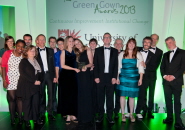The University of Bristol has signed a UNESCO Global Action Programme commitment, in advance of there launch of the next UNESCO strategy for Education for Sustainable Development (ESD).
As the UNESCO decade for ESD draws to an end, UNESCO has reviewed progress, and will this November launch a new Global Action Programme focussed on four key areas which most urgently need more attention.
My own journey, and Bristol’s very much reflects the picture UNESCO has found. A decade ago ESD was largely below the radar in Higher Education (HE). Lots of great things were going on, but as local initiatives by keen academics. Typical of the time, we won our first Times Higher Award and Green Gown Award for what was then a very innovative interdisciplinary open unit on Sustainable Development, available to any student, whatever their degree. Nearly a decade later, UNESCO has set us all the challenge of moving from hot spots of excellence to whole institution approaches. Bristol has committed to meeting that challenge.
 |
| The University of Bristol collects its 2nd Green Gown Award in 2013. |
We changed gear to a whole institution approach about three years ago, when we were selected as one of six Green Academies by HEA. I’ve never been a fan of labels, but in this case it was the catalyst for moving to a whole institution approach – and in 2013 the University was awarded another Green Gown, but this time for whole institution continuous change. The whole University is taking education for sustainable development seriously, every part of the institution is doing something. Our challenge now is to connect all of this is up, to deepen student opportunities to engage with uncertainty, with the challenges of sustainability in their studies, informal activity and in the subliminal curriculum. The key for me is ensuring our students have adaptive capacity – the ability to live with uncertainty and take decisions based on evidence. Without those skills the sirens of cosy avoidance of the crisis facing our planet beckon. We can let the evidence speak for itself, as long as our students have the skills to listen.
Our UNESCO commitment is to ensure all students encounter sustainability through their formal studies, have opportunities to link theory and practice through informal activity or community based projects, learn subliminally about sustainable lifestyles through the way the precinct is run (estates) and understand how central sustainability in its many aspects is to our research. This autumn in advance of the Nagoya launch, all Bristol students will be encouraged to take the Global Sustainability Literacy Test. As one of the launch partners, the Cabot Institute as a research institute is central to this – showing the importance of living with uncertainty and bringing people together on an interdisciplinary basis to address these challenges.
Whether your expertise is in environmental, social, economic or cultural sustainability you have an important part to play in building both the knowledge and skill sets to help achieve the UNESCO aims.
Bristol has pledged to play its part.
———————————-
This blog post is written by Cabot Institute member, Chris Willmore, University Academic Director of Undergraduate Studies, University of Bristol
Further reading
– Education for Sustainable Development at the University of Bristol
– Community Based Learning at the Cabot Institute
